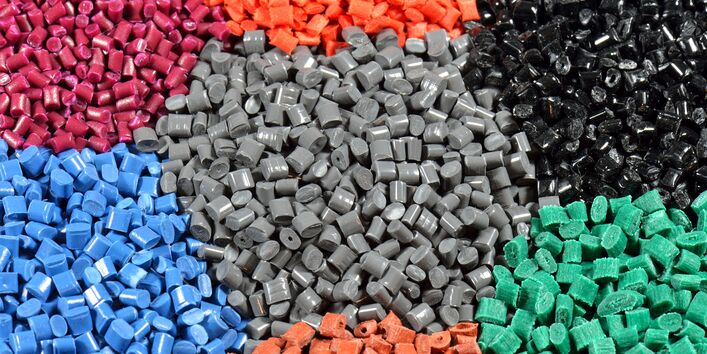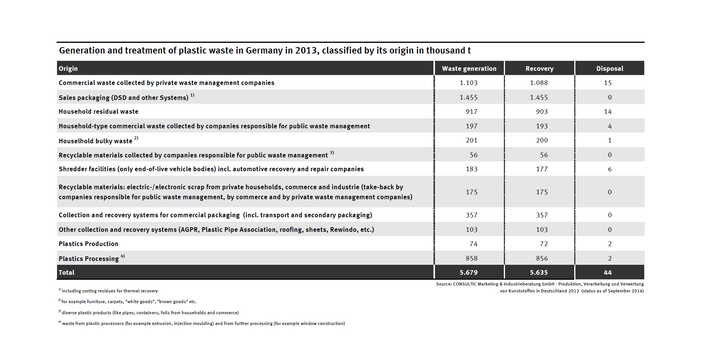Plastic waste in Germany
More than 5.68 million tons of plastic waste were generated in Germany in 2013, over 4.75 million tons of it household or commercial waste; the remaining 0.93 million tons were production and processing waste. The lion’s share of plastic waste (1.4 million tons) was attributable to packaging.
Legal framework
Although there is no specific law concerning the collection and recycling of plastic waste, paragraphs 14(1) and (2) of the Law on Closed Cycle Management (KrWG) stipulate that beginning in 2015, all plastic waste is to be collected separately and that as from 2020 at least 65 weight-percent of all municipal wastes are to be recycled.
Municipal waste however, contains other materials besides plastics. The treatment of plastics in many different municipal waste streams is regulated by respective acts. For example, Germany’s Electrical Products Act (ElektroG) requires that plastics containing brominated flame retardants must be removed from electrical and electronic waste, while the End-of-life Vehicle Act says that large plastic components such as bumpers must be removed from cars before they are scrapped, so that these elements can be recycled. The Packaging Ordinance stipulates that 60 percent of all plastic packaging is to be recovered, and of this amount 60 percent is to be recycled.
Recycling
Almost all plastic waste is recovered (99 percent in 2013). It is either mechanically recycled (41 percent) or energetically recovered (57 percent). Feedstock recycling makes 1 percent. The table below provides an overview of total plastic waste generation and treatment in 2013.
To promote plastic recycling and separate collection of plastics, a uniform nationwide collection system for dry recyclables is planned in accordance with the Law on Closed Cycle Management (KrWG). Under this new regime packaging and other plastic and metal product waste will presumably be collected and recycled together. If packaging collection was expanded to a system whereby all dry recyclables were placed in the same bin, this would make greater amounts of material available for recycling and at the same time promote environmental protection. Various municipalities and counties have carried out pilot projects or have already implemented such a collection system. It has been tested, for example, in Leipzig (Gelbe Tonne Plus) and Berlin. The UBA has conducted numerous studies that scientifically demonstrate basics for the implementation of a more extensive collection of recyclable materials and for an adaptation of amending recycling regulations. The findings of these studies are available under “Publications” (with English summary).
Especially commercial plastic waste shows high potential for being recycled mechanically as it commonly appears as a mixture of different plastics and therefore is not recycled sufficiently so far. In accordance to a draft of the amendment of the Commercial Wastes Ordinance (GewerbeAbfV), commercial plastic waste is primarily to be collected separately to facilitate a high-quality recycling. Remaining waste of mixed plastics is to be treated in sorting machines at a minimum standard to exploit potential materials for a mechanical recycling.
Data on quantities originate from the study “Produktion, Verarbeitung und Verwertung von Kunststoffen in Deutschland 2013” (Consultic GmbH).

